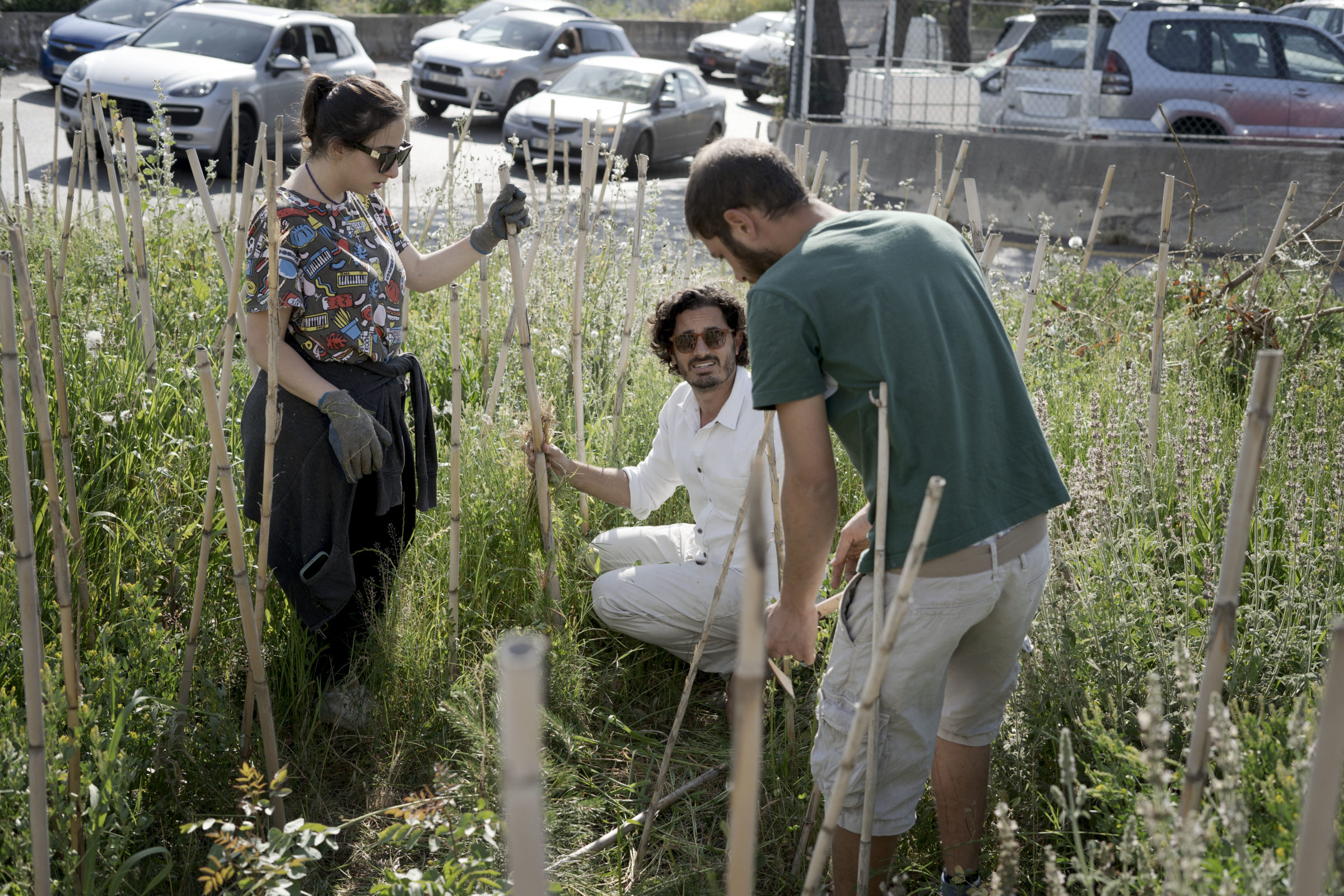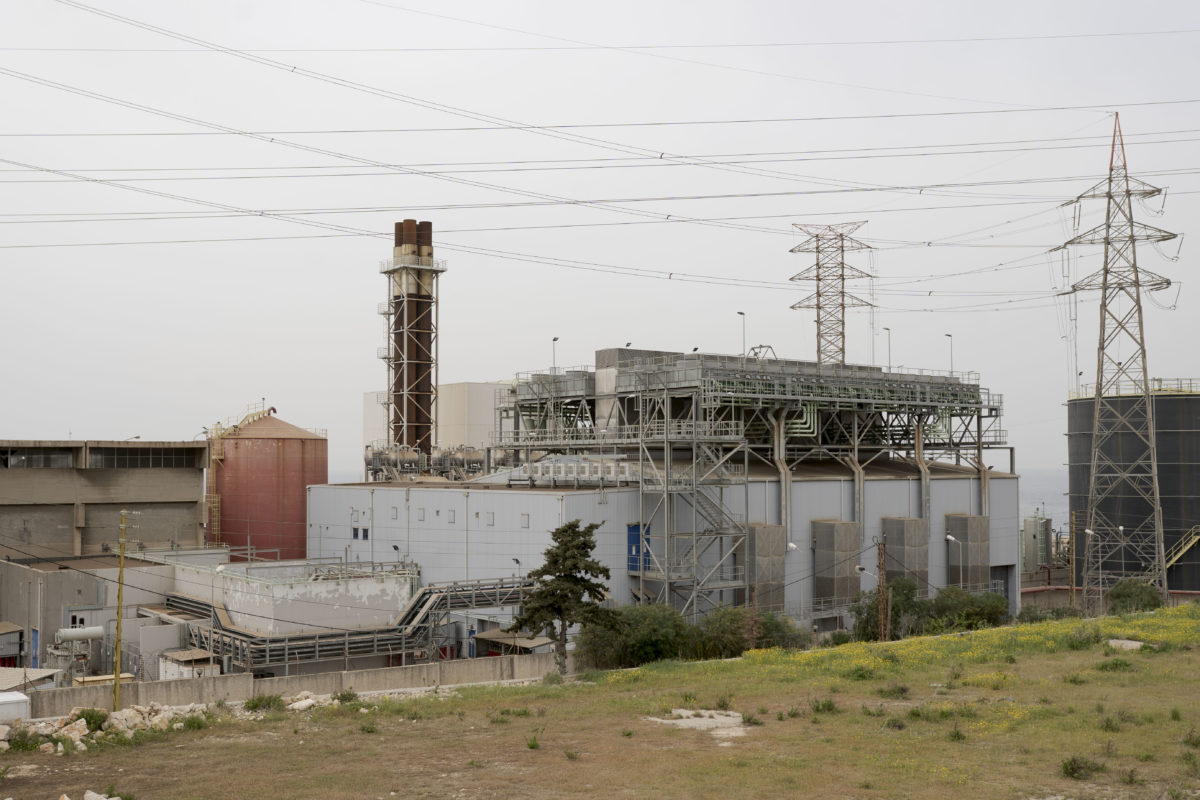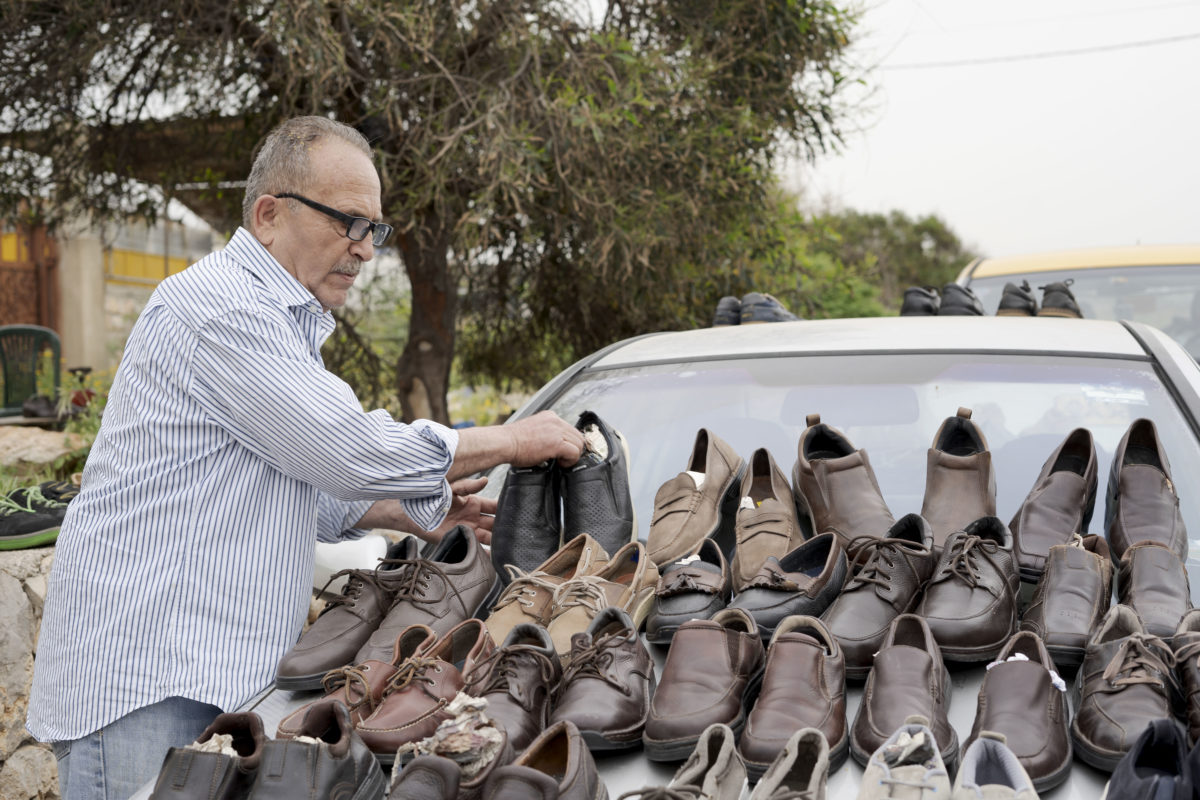In 2013, BWSC, a Danish company based in Allerød, made a multimillion dollar deal to expand two of Lebanon’s diesel power plants. Both development projects were completed in 2017. The power plants were to run on heavy fuel oil (HFO), considered to be one of the most polluting fuels in the world.
In brief
EKF, the Danish Export Credit Agency, supported the project with a loan of almost 2 billion DKK (284 million $). Also, Denmark’s embassy in Lebanon played a key role in accomplishing the agreement.
In brief
Today, however, the power plants have stirred major controversy: A small tourist town, located in the very vicinty of the larger of the two diesel power plants, is now considered the fifth most polluted city in the Arab world.
In brief
Experts criticize Denmark for promoting itself with self celebratory speeches on the home front, while for years upholding a practice of funding and supporting highly polluting projects abroad.
In brief
Previous
Next
Fadi Abou Khalil never hangs his white clothes to dry.
“We can only wear black clothes. If you wash a white T-shirt and hang it to dry here, smoke particles will stick to it and discolor it,” Fadi Abou Khalil tells us when we meet him on the roof terrace above his house. With his big round eyes, a gray-black beard and dressed in a black hoodie, Fadi Abou Khalil contemplates the power plant that blocks his view of the sea in the coastal city of Zouk Mikael, located a little north of Lebanon’s capital Beirut.
»The noise from the powerful engines is going on all day. Our breathing is affected by the pollution, the dust, and the smoke descending on us,« says Abou Khalil, who works as a musician on a daily basis.
The power plant in Zouk Mikael entered into commercial operation in 1987 and has been criticized for its polluting for many years. But according to the residents of Zouk Mikael, thing only got worse after the Danish company BWSC enlarged it with a secondary power plant also running on heavy fuel oil (HFO).
»In the past, we were not as much affected in this area because there were only two high chimneys and the smoke tended to drift towards other areas. Now, unfortunately, 10-12 shorter chimneys have been added. It has not helped us in any way. On the contrary, the smoke bothers us even more now,« observes Maroon Abou Khalil, Fadi Abou Khalil’s cousin, who runs a car workshop on the ground floor of the house, which is located a hundred meters from the power plant.
In a collaboration with Daraj, a Lebanese investigative media outlet, Danwatch visited the cities of Jiyeh and Zouk Mikael in Lebanon, where residents testified to us how soot particles, acid rain, noise, smoke and the smell of fuel from the two power plants have become a normal part of everyday life.
For many years, the two power plants have formed an important part of the backbone of Lebanon’s power supply. Consequently, a great deal of enthusiasm was generated in 2013, when the Danish company Burmeister & Wain Scandinavian Contractor (BWSC), in a consortium partnership with the German company MAN Diesel & Turbo, won two contracts for almost two billion DKK (280 million $), tasking them to enlarge two power plants with a total of 272 megawatts.
At peak load, the Danish power plants theoretically should be able to cover approximately 18 percent of Lebanon’s current electricity needs.
»We are, of course, extremely satisfied with winning these two considerable contracts, that taken together constitute the largest order in BWSC’s history,« said BWSC’s director at the time, Anders Heine Jensen. And BWSC was not left to its own devices when undertaking this enormous task. In addition to crucial help from the Danish Embassy in Lebanon, the Danish Export Credit Agency (EKF) helped the Danish company winning the contract by offering Lebanon a loan of more than DKK 1.9 billion to pay BWSC for the project.
According to EKF, the power plant, which runs on heavy fuel oil (HFO) – one of the world’s most polluting fuels – was part of Lebanon’s plan to ensure a »more stable supply and in the long run, also implementing more renewables in the grid«.
In Lebanon, however, the power plant is known as the »powerhouse of death« – a nickname reflecting that fact that its combustion of HFO emits enormous amounts of CO2, nitrogen oxides, soot and sulfur dioxide, which not only have a negative climate impact but also contribute to cause diseases among locals. And BWSC’s power plant enlargement has in no way improved the situation.
On the contrary, the emission of polluting particles from the Zouk power plant has proved to be a direct cause of in turning the nearby tourist town of Jounieh into the fifth most polluted city in the Arab world and the 23rd most polluted city in the world. This transpires from a report from published by Greenpeace in 2018, the year after BWSC’s enlargement of the power plant was completed.
And what about the stable power supply that should have given the Lebanese 3.5 more hours of electricity a day? So far, no progress has been made. Lebanon’s economic crisis has exacerbated problems in the energy sector leading to a final collapse of Lebanon’s power supply in the summer of 2021. Today, most Lebanese are restricted to only 1-2 hours of electricity per day through the public power grid.
»We often see companies in the global north – being bound by legislation in their home countries to not exceed a certain emission level of polluting particles – operating in global south countries in a way where they contribute to air pollution without following their own guidelines«, Julien Jreissati, head of Greenpeace in the Middle East, stresses in an interview with Danwatch and Daraj.
Danwatch and Daraj reached out to BWSC for answers as to the kind of efforts the company has put into reducing environmental pollution from the two power plants and how it responds to the consequences of its power plant pollution for ordinary Lebanese.
We were also looking for an answer as to the present status is in an ongoing arbitration case between BWSC and the Lebanese government, where the Danish company has sued Lebanon for at least 130 million dollars (approximately 915 million DKK) over the issue of several exceeded payment deadlines in connection with the project .
But BWSC has declined all interview request as well as refrained from answering our written questions. »In principle, we cannot and will not answer questions on specific customer relationships«, writes Torben Eriksen, BWSC’s project manager in Lebanon.
EKF also declines granting an interview. But in an email response to Danwatch and Daraj, EKF maintains that both power plants »work as intended« and »do produce a stable electricity«, which reduces pollution from private generators.
Furthermore, EKF emphasizes that its financing of the power plant was enacted before the agency’s current climate policy, which is said to be in the process of »phasing out export financing of fossil fuels in the energy sector abroad«.
This decision followed in the wake of a Danwatch exposure from 2021, reporting on a similar but newer HFO power plant constructed in Bermuda – also, according to experts and citizens, to the great detriment of the climate and local residents.
Read more: Dansk eksporteventyr er et mareridt for klimaet – og for naboerne
In a reply to Danwatch and Daraj, the Ministry of Foreign Affairs emphasizes that since the end of 2021, Denmark has halted »public Danish financing and assistance for the export of fossil fuels in the energy sector abroad«. The letter also explains that the Danish embassy in Lebanon helped BWSC as a part of its task of »opening doors to local authorities and other relevant stakeholders for the purpose of strengthening exports«.
Lebanon to the polls
On May 15, 2022, the Lebanese go to the polls for the first time since the government was overthrown during popular protests in 2019, which many Lebanese refer to as the »revolution«.
The election comes at a time when Lebanon is in the midst of one of the worst financial crises in the modern world. According to the World Bank, it is caused by a political elite, who »wilfully« has brought the country into disrepair through years of corruption, nepotism and unfair distribution of the country’s resources.
In 2020, Lebanon’s GDP shrank by 21.4 percent and last year the economy shrank by a further 10.5 percent, the largest decline among the world’s 193 countries. At the same time, the country experienced the world’s third highest inflation rate, surpassed only by Sudan and Venezuela, and the currency has lost 93 percent of its value over the past two years.As a consequence of its economic collapse, Lebanon can no longer to afford to keep its electricity production running. »With the current economic crisis, Lebanon can not afford to buy oil, so only 10-20 percent of the country’s energy needs are currently being met,« Jessica Obeid, one of Lebanon’s leading energy experts, explains to Danwatch and Daraj.
But the power still being produced is partly generated from the two coal-black power plants, which were developed by the Danish company BWSC with support from Danish public agencies.
»This was how they destroyed people«
Heavy Fuel Oil is a residual product from the refining of oil, and the tar-like substance also stands out from other energy sources by its many harmful effects on humans and the environment.
The Lebanese doctor Paul Makhlouf knows this all too well. In his white coat in his office at Notre Dame University Hospital near the Zouk power plant, he talks about the power plant’s impact on local citizens.
With a stethoscope around his neck Makhlouf puts on his glasses and begins browsing through a stack of papers on his desk.
»Here it is!«, he exclaims when he finally succeeds in finding his research paper on air pollution around the power plant, which dates back to the year 2000 – many years before, BWSC developed the power plant.

Paul Makhlouf is a doctor at the local hospital near Zouk Mikael. He explains that the air pollution from the Zouk power plant is a co-cause of making his patients sick. Photo: Florian Elabdi
Except for the Greenpeace report from 2018 – which confirms that air pollution in the tourist town of Jounieh near the Zouk power plant is higher than in the rest of Lebanon – no new research has been published since BWSC enlarged the power plant’s capacity by 194 megawatts.
»At the time, we found that among the residents close to the power plant, there was a much higher number of respiratory infections, especially asthma and child allergies, compared to the rest of Lebanon. There were also a higher number of cases of the lung disease COPD and cancer«, Paul Makhlouf points out, referring to his research.
At the same time, he sees no reason to dispute the assertion, that the situation must have worsened, since BWSC’s enlarged the the diesel power plant with 11 new chimneys: »If we did a new study, the results would undoubtedly be even worse. Now more people live her, we have more traffic and more chimneys at the power plant, which use a cheaper and more toxic oil than before on account of the economic crisis,« he says. That a large part of the pollution demonstrably does originate from the power plant is also confirmed by Greenpeace.
»We could see from satellite images in our study in 2018 that a large part of the fume came from the Zouk power plant,« says Julien Jreissati, head of Greenpeace in the Middle East.
The towns of Zouk Mikael and Jounieh are located on the Mediterranean coast, but surrounded by mountains, which means that the smoke from the power plant has a hard time evaporating instead settles like a heavy smog over the towns. This is explained by the Lebanese doctor Paul Makhlouf, who specializes in lung and skin diseases:
»There are several reasons why we see more cases of disease here. One is, of course, that the power plant’s emissions of polluting particles are unhealthy for the environment, the second being that the geographical specificity of the area means that it becomes more polluted,« he says.
Play Video
Julien Jreissati, programme director at Greenpeace in the Middle East, talks about how European countries have green goals and ambitions for their own countries, but support fossil energy projects abroad.
Play Video
Najat Saliba, professor of chemistry, has previously researched the air pollution in Zouk Mikael. In 2015, her research showed that the city had one of Lebanon’s highest levels of air pollution. When Greenpeace looked into the air pollution three years later, Zouk Mikael had not only the highest level of pollution in Lebanon, but also one of the highest in the entire Middle East.
Although Mr. Makhlouf stresses that many factors contribute to the pollution, including car traffic and private generators, he does consider the power plant to be a major culprit: »When a sick patient walks into my clinic, I cannot tell, whether he has become ill because of the power plant, of course. But the density of toxic particles from the power plant, such as sulfuric acid and soot, is so intense that it directly affects the health of my patients,« he says.
»They promised us electricity, but they have only destroyed people with their poison, and all the different enlargements of the power plant in some way did contribute to that.«
EKF knew about the potential contamination
The Danish enlargement of the power plants began in 2013, but before that, the Danish government helped pushing through the billion-dollar, in particular Danish Export Credit Agency (EKF), which issued loans and guarantees totaling almost DKK 2 billion for the two projects. Today, EKF and the Danish government no longer finance fossil power plants abroad. That decision was taken in the wake of Danwatch investigave reporting from 2021 on a similar but newer HFO power plant in Bermuda, which according to experts and citizens is highly detrimental to the climate and to residents.
However, such considerations were not taken into account when export subsidies were granted 2012-2013.
Also EKF entered the project well aware that the power plants were at risk of developing into major sources of pollution in the country. In EKF’s CSR report from 2013, the agency noted that seven projects had a potential to become significant CO2-polluters, and this was especially true of the two power plants in Lebanon.
In addition, the CSR report from 2013 also states that EKF was aware of the risk that the power plants might end up emitting large amounts of the toxic gases NOx and SOx, which would exceed limit values for acceptable pollution as determined by the International Finance Corporation (IFC). EKF itself admits that these guidelines are to be followed when assessing environmental consequences of its business activities.
NOx and SOx are both harmful gases that are formed during the burning of HFO, and through chemical transformations in the atmosphere both can contribute in creating smog, soot and acid rain, causing major health problems like respiratory and lung diseases as a consequence.
Soot pollution from HFO in particular increases the risk of developing a number of disorders, Kåre Press points out.
»Those who get sick usually incur respiratory diseases such as asthma, bronchitis and COPD, especially children may suffer severely from asthma. Speaking of mortality, primarily adults die of cardiovascular disease and blood clots, including cerebral haemorrhage. In addition, soot particles are carcinogenic at the highest level.«
Danwatch and Daraj approached EKF to enquire about the agency’s considerations on issuing loans and guarantees for a project knowing full well that it would be environmentally polluting. In an email to Danwatch, EKF states that decisions on financing of power plants in Jiyeh and Zouk Mikael in Lebanon were taken before EKF’s current climate policy.
»EKF’s climate policy of November 2021 includes a halt to all export financing for thermal coal extraction, thermal coal logistics and coal-fired power plants. The policy also states that from the beginning of 2022, export financing of fossil fuels in the energy sector abroad will be phased out«, EKF’s press officer Ina Bjerregaard-Castenborg clarifies in the email.
Read more: Efter Danwatch-afsløring: Stop for eksportstøtte til forurenende kraftværker
»Limit values were to high«
Although official policy at the time did not prevent EKF from funding fossil fuel projects around the world, they still had measures in place to reduce the environmental impact as much as possible. Among other things, EKF required that CO2 reports were to be prepared as long as the loan has not been repaid, accounting for how much any given project pollutes, and in fact, this was also done in connection with the Danish-funded power plants in Lebanon. In this case, a German engineering company, MVV Decon, compiled the reports for EKF.
As in the agency’s CSR report from 2013, EKF in this case also bases its assesments on limit values as set by the IFC. If one or both of the power plants exceed a certain limit value, EKF is required to take necessary steps to reduce emissions.
Danwatch has been granted documentary access to the CO2 reports on the two power plants and we asked an expert to assess the pollution data referenced in them. DTU air pollution and climate researcher Kåre Press at first concludes that IFC’s limit values are already far too high when compared to modern standards, and yet the power plant emission trangresses them:
»SOx and particulate emissions should be halved, and NOx should be a factor of 10 lower than measured. This can be easily achieved through desulfurization, filters and selective catalytic reduction (a technology that reduces NOx emissions, ed.). Still, it does not seem that these technologies have been installed. I completely fail to understand how EKF can embrace a project without even ensuring an effective flue gas cleaning« Kåre Press observes.
We have asked BWSC whether the company in fact did install some of these technologies ind order to reduce air pollution, so far without any response.
In response to queries from Danwatch and Daraj, EKF concedes that emissions from the power plants could not comply with the limit values at that time, and that EKF since then have been working continuously to bring the figures down. So far without any huge success, the CO2 reports show.
In 2017, for example, power plant emissions in Zouk Mikael exceeded the limit value for permitted emissions of NOx, which was also the case in 2019. EKF, however, claims that the agency never received data on air quality in the two cities, allegedly because they are »still under validation by the Ministry of Environment«.
We asked EKF for an explanation: How come emissions are not lowered if attempts are made to bring them down? And did they ever received data on air quality in the two cities? In an email response, they reply:
»The export loan was repaid in November 2019, therefore EKF has not subsequently received any reports from the project. However, EKF upheld the dialogue until the loan was repaid in order to ensure a recution of values.«
Danish climate hypocrisy?
The same year that BWSC began its development project with financial support from EKF, The cabinet of Prime Minister Helle Thorning-Schmidt, Denmarks’ government at the time, published its long-awaited climate plan. »Progress in global climate action so far has been far to modest,« its the foreword read.
It is quite a paradox that our politicians at home is giving green self-celbratory speeches again and again, telling the public what a green nation we are, while Denmark, on the other hand, is financially supporting black energy projects in developing countries
Kåre Press-Kristensen, Rådet for Grøn Omstilling
Therefore, more action had to be put behind words, and as the climate plan emphasized: Denmark is a rich country that must lead by setting a good example. But despite the stated ambitions to reduce global CO2 emissions, the Danish embassy in Lebanon decided to help BWSC achieving the billion deal for the two polluting HFO power plants.
»Lebanon is a new market for us. For this reason, we are also very grateful for the fantastic support we have received from the Danish Embassy in Lebanon. The embassy has done a marvelous and completely unprecedented job, and without it we would not be where we are today,« said Anders Heine Jensen, then CEO of BWSC, when the contract was finalised.
»It’s a gigantic contract. It is probably the biggest contract I will ever have the opportunity to achieve for Denmark«, said Jan Top Christensen, Denmark’s then ambassador to Lebanon. »This contract is going to have a huge impact on millions of people,« he continued.
Denmark’s former Minister of Trade and Investment, Pia Olsen Dyhr, also lavished big words on this »environmentally friendly« project, in spite of the fact that Danish side was well aware of the extensive pollution this project would contribute to:
»It’s a historic contract. I am glad that it will benefit growth and employment in Denmark and give Lebanon a more stable and environmentally friendly energy production,« said Mrs. Olsen Dyhr.
Kåre Press, the researcher from DTU, is shocked by the Danish project, and even more so over the fact that it is described as environmentally friendly.
»First of all, I would like to say how shocked I am that Denmark is finansing power plants that use heavy fuel oil, which is one of the world’s most polluting fuels. In no way, should we be doing such a thing. We should instead be globally enowned for delivering energy technologies that solve environmental and climate problems – not fossil energy technologies that create environmental and climate damages,« Kåre Press writes in an email to Danwatch.
At the same time, he is also puzzled by such a flagrant discrepancy between ambitious green promises on one hand, and real life black actions on the other.
»It is quite a paradox that our politicians at home is giving green self-celbratory speeches again and again, telling the public what a green nation we are, while Denmark, on the other hand, is financially supporting black energy projects in developing countries,« Kåre Press-Sørensen writes.
Danwatch and Daraj have asked the Ministry of Foreign Affairs why the Danish embassy in Lebanon ventures to help BWSC win the contract in the first place, since it was clear from the outset how polluting HFO power plants are, and whether Denmark couldn’t have a found a greener solution to offer instead.
»Danish embassies help Danish companies around the world on a daily basis to open doors to local authorities and other relevant stakeholders with the aim of strengthening exports of, Danish energy technology, among other things,« a spokedsperson from the Danish Ministry of Foreign Affairs states. »In this particular instance, the Ministry of Foreign Affairs carried out this assistance in Lebanon at the request of the BWSC«.
On the question of whether Denmark could have offered Lebanon a more climate-friendly solution, the Ministry of Foreign Affairs does not consider that it could have put more effort into finding better alternatives.
»It was solely up to the Lebanese authorities to organize the tender process in this specific case, just as they alone decided which energy solution they eventually wished to go ahead with,« the ministry writes. Like EKF, the Ministry of Foreign Affairs emphasizes that at the end of 2021, the government decided to stop all public Danish financing and aid for export of fossil fuels to foreign energy sectors.
»The current government has a crystal clear ambition to strengthen Danish exports of green technology solutions. Therefore, it is also a greater priority for the Foreign Service today o ensure that our economic diplomacy and assistance to Danish companies abroad do pursue a greener and more sustainable agenda than has formerly beent the case,« the Ministry of Foreign Affairs states.
Danwatch has applied for documentary access to files from the Ministry of Foreign Affairs on the communication between the Danish Embassy in Lebanon and the Lebanon Ministry of Energy in order to clarify to which extent Denmark was involved in the project, but after three months, the Ministry of Foreign Affairs still has not finalized our request.
It is very unfortunate that developed countries in the EU lend us money and provide us with completely obsolete technology. They do one thing in their own countries like installing renewable energy technologies, and another thing here leaving us with outdated, polluting technology. It really is a wasted opportunity.
Adib Dada, architekt
The Lebanese are trying to tackle the pollution
Back in Zouk Mikael, architect Adib Dada and a group of Lebanese volunteers weed in a small forest they have planted between two busy partitions in the heart of Zouk Mikael with the power plant’s huge red and white chimney looming in the background.
»We are in Lebanon’s most polluted city,« said Adib Dada as Danwatch and Daraj met him on a sunny afternoon. According to a Greenpeace report from 2020, Lebanon already has the highest mortality rate in the entire Middle East due to air pollution. And the report explicitly points to power plants using fossil fuels as one of the main causes of air pollution.
Therefore, Adib Dada and his group of volunteers have chosen to take matters into their own hands: They have planted a »power plant forest«, as they call it, close to the Zouk power plant. »My idea was to plant a series of micro-forests close to the power plant, which could help clean the air,« he explains in his white shirt and curly black hair as he squats and tears weeds up from the root.
»We selected 17 different plant and tree species that are endemic to the surrounding natural areas around Zouk Mikael and that make up the natural ecosystem,« explains Adib.
Adib Dada’s project is one of his many similar projects around Lebanon, which seeks to integrate nature into modern urban development. And when he was contacted by a resident of Zouk Mikael, who told about the city’s pollution problems, he was in no doubt about where to start his next project.

Adib Dada and his group of volunteers look after the power plant forest in Zouk Mikael, which they planted in 2020. Photo: Florian Elabdi
By requesting documentary for access to EKF, Danish embassies and Lebanese authorities and by reviewing EKF’s annual and sustainability reports, Danwatch, in collaboration with the investigative Lebanese media Daraj, was able to examine power plants in Lebanon, funded and built by Denmark.
Queries in local news media and social media in Lebanon enabled us to uncover local pollution from power plants and to highlight the Danish government’s involvement in the multimillion dollars contracts.
We subsequently visited the power plants in Lebanon, where we talked to residents and doctors in the two cities about the pollution and how it affects them. We also interviewed Lebanese officials who were responsible for granting Denmark the contract about the process.
We have presented our documentation to Danish and Lebanese experts in air pollution. This investigative study was conducted with the support of the Journalismfund.eu
»My work as an architect contributed in a way indirectly to climate change, so I started thinking about how to use architecture to mitigate climate change instead,« explains Dada about her purpose with the many projects.
Their aim is to plant another five micro-forests near the power plant, but the completion of the project depends on additional funding from donors inside and outside Lebanon.
And while some relatively small forests at intersections and roundabouts are not going to change anything significant for the pollution in Zouk Mikael, Adib Dada believes that architecture should be part of the solution in combating climate change.
»Sure, a micro-forest like this may not have a big impact on the pollution in the area, but it’s a great conversation starter and also a proof of concept where we show that we can plant forests in small areas of the city and that architecture and nature do not have to be opposites.«
Before we say goodbye, Adib Dada makes a final point criticizing Denmark for having contributed to the current pollution in Zouk Mikael.
»It is very unfortunate that developed countries in the EU lend us money and provide us with completely obsolete technologi. They do one thing in their own countries where they install renewable energy, and another thing here where, leaving us with outdated, polluting technology. It really is a wasted opportunity.«




